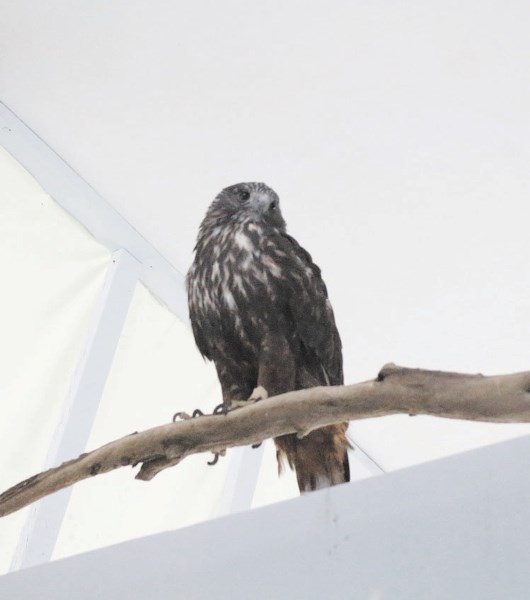Humans aren’t necessarily the only ones taking part in holiday cheer this season.
Birds gorging on fermented mountain ash berries may not behave much differently from those celebrating Christmas cheer with an extra glass or two.
For the Bohemian waxwing bird, who is both native to this region and has migrated here from northern homelands, feasting on the fermented berries can wind up fatal — including drunkenly flying into windows that may render them stunned or out of commission, if not meeting an untimely demise.
“The mountain ash berries stay on longer than other berries,” said Brett Boukall, a wildlife biologist with Alberta Fish and Wildlife, adding that they would field such calls to local wildlife rehabilitation centres, which are equipped to take in the birds.
Of the six wildlife rehabilitation centres in the province of Alberta that are listed on albertawildliferehab.org, three of them are conveniently located a short distance from Cochrane — the Cochrane Ecological Institute (north of town), the Calgary Wildlife Rehabilitation Society (northwest Calgary) and the Alberta Institute for Wildlife Centre (AIWC; in Madden).
Stacey Jespersen is the director of wildlife care at AIWC. While she said ‘drunk birds’ don’t account for a huge jump in intake at this time of year, it does happen.
People who come across a bird victim to drunk navigation should place the bird in a cardboard box and phone a wildlife rehabilitation centre; in many cases, the bird just need a few minutes to get it’s bearings and will take flight on its own.
In other cases, a drunk bird may find that last window strike its last.
Such is the story a Bohemian waxwing brought in to AIWC last week; the injuries sustained from a window strike wound up with the bird being euthanized.
“It’s just like any other animal, they’re just trying to eat as much as they can (before the cold weather sets in),” said Jespersen.
She said that certain precautions can be taken to reduce the number of casualties, including placing bird decals on windows; partially closing drapes or blinds; and not placing bird feeders directly near your crystal-clear glass.
In northern communities, such as the Yukon, there are higher concentrations of drunken birds gorging on mountain ash berries. Environment Yukon has gone so far as to set up an avian drunk tank for the birds to sober up in before being released.
The AIWC is a registered charity and non-profit society in Madden that has been operational since 1993.
Managed by a team of wildlife biologists and technicians, AIWC is heavily reliant on the charitable efforts of their volunteer base. They are currently looking for more wildlife rescue drivers.
Funded largely by grants, donations are always welcomed to assist with operational costs. Each year the facility assists some 2,000 animals — many of which are bird species.
To learn more, visit aiwc.ca. If you have found an injured or orphaned wild animal, contact 403-946-2361.




